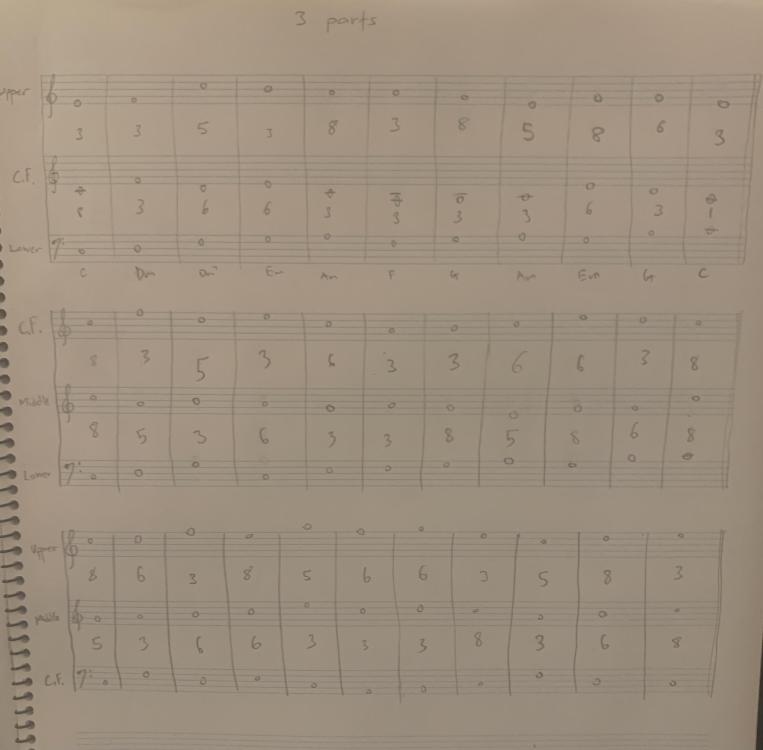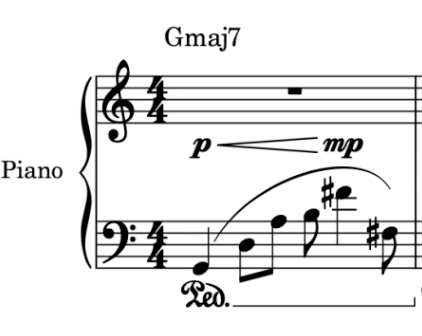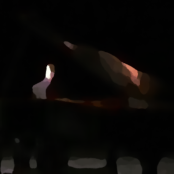Search the Community
Showing results for tags 'harmony'.
-
Not sure if this is the right place for this post, but I came across something, quite simple but still fun. Was browsing youtube and stumbled upon a video. At the very beginning, the creator presented a 4 bar line of a Violin melody. (I've altered it a slight bit to make it a tiny bit more interesting. the original challenge melody reused the 1st measure, except with the same 4 32nd notes you see at the end of bar 3. I elected to simply change it to Gb, rather than staying on the G. I also included an ending 1 and a fine measure to sort of round it out a bit more. Here is the Challenge Melody): The instrumentation to be used for this challenge includes Vln. 1 & 2, Viola, and Cello. 4 Staves, with Vln. 1 already written for ya. Just curious to see what everyone else comes up with 🙂 Here is mine! I'm not a virtuoso or a master so mine will probably pale in comparison to some of yours. Lets see it! Harmony Challenge.mp3
-
Hi everyone, I’m new here! I’ve seen a few other pieces of music shared here, and it seems like the perfect place for me to join in. I’m a French student, and I’ve spent 12 years studying piano at a conservatory. Recently, I’ve started composing, and I feel confident enough about what I’ve created to share it with you. Right now, I don’t have anyone around for active listening, so I have no idea how to assess the quality of my compositions. I’d really appreciate honest feedback (whether it’s theoretical or just based on your feelings) to understand where I stand and how I can improve. I hope you will feel as much emotion listening to it as I did composing it 😀 Thank you in advance for your time and your insights!
-
Hello! I thought I’d share a link to my new book, in case you’re interested in this topic. "Designing Music for Emotion: A Practical Guide for Film and Media Composers and Music Enthusiasts" The book is a practical guide on how to write music that elicits different emotions such as happiness, sadness, love, anxiety, triumph, wonder, fear and many more. It's packed with dozens of techniques, over 60+ music reductions (and audio) and research-backed insights to help you create music that truly moves your audience. Foreword by Jay Chattaway (EMI award winning Hollywood composer, "Maniac", "Star Trek TV Series") 308 pages, 98 figures, 45 tables https://amzn.eu/d/aV9GRj5 One of the full orchestral scores discussed within the book with score reductions, "Sintel", is free today Best Regards
- 2 replies
-
- film music
- orchestral music
-
(and 4 more)
Tagged with:
-
This is my first fugue, I followed a structure given by Albrechtsberger’s. Some feedback will be appreciated, just note that this is my first fugue so it isn't the best. I'm looking to turn it into a keyboard fugue and need some help on that as well. Thank you Fugue - F major.pdf
- 4 replies
-
- composition
- feedback
-
(and 1 more)
Tagged with:
-
- 1 reply
-
- counterpoint
- harmony
-
(and 2 more)
Tagged with:
-
This is my rough final draft of a piece I've been working on for a string quartet with clarinet and violin. My main thing right now is getting everything connected and refining my harmony. I wrote some sections that are just there and have no relation to the piece. I am also trying to follow my modern-classical-lush sound in the harmony, but I haven't perfected it. If you could please look it over, maybe mark it up, give some harmony/chord progression suggestions, and anything else, I would greatly appreciate it. Some "rules" I've learned for getting that sound - every chord gets a 7th (at least) - trying to always use the full chord - Use functional tonal harmony, and color special moments with chromaticism (iii7 a lot, modeal mixture, and secondary dominants)
-
When a few long months ago I started to review music from its medieval beginnings, I realized how strongly the later styles are related to the preceding ones. I also realized that to half-master a style it is ridiculous to look at a few pieces and try to imitate. The background in any period of music is immense. So I went through baroque, galant, romanticism (from which I'm still getting a thousand things). And I arrived at “jazz”. It is a confusing corpus. On the one hand it is based (in great part) on tonal and functional harmony, on the other hand it is out of control. What I knew about jazz, other than listening to it, was a quite small part of what it is, mostly because I didn't have anything structured. I'll never be a jazz musician, but my idea is to absorb what's useful to me in writing music. I think that to move in this field you have to: 1. Master classical harmony. 2. Voicings. Essential, the voices jumping back and forth without order is chaotic, apart from the fact that different arrangements of the voices transmit different things. 3. Control of the chordal extensions, the fifth is relegated to semi-oblivion. 4. At a more advanced level: chords by superposition of triads, polychords...., but all this with its logic and resolutions. And to be a little brave experimenting with all that and more. In this little piece what I wanted was to incorporate something classical as well, so it's based on an arpeggio. This one is made up of: Fundamental, Fifth, Ninth, Third and Seventh (natural or flat depending on the chord). That is the basis of the whole composition. I think it sounds classical because of the arpeggio, but incorporating ninth and seventh systematically takes it to another point. The melody emphasizes other notes which are the tensions, third and seventh. And take advantage of the alternative resolutions of the dominants to modulate. Well, it is an exercise.
-
According to this article, 4 part chorale-like voice leading (part writing), despite being taught in music conservatories, is not used in orchestral music. I understand the basic concepts of voice leading, voice independence, which note to double, and resolving in the "right" direction, but I haven't worried to much about learning strict textbook voice leading. (I admit these concepts can be hard to prioritize and I think that might be where I got the idea of adding another voice or two) I know it's a lot, but here are the things I want to clear up for myself: 1. When people write in more than four voices, do they use standard 4 part voice leading and add in additional parts to fill in space, or do they voice lead all of the parts? I imagine both methods are used, but what do I know? 2. Is it easier to voice lead in, say 5 parts, rather than in 4? I understand that the more voices you add, the more responsibility you have to lead (resolve?) all of them, but I feel like a lot of specific rules for specific situations come from the limitations of 4 parts. For example I feel like it might be easier to balance doubling the correct note and writing independent lines, in 5 voices. 3. How is voice leading used in modern composition? I would probably just voice lead the chords and write the melody and countermelody together separate from the chords, not considering them in voice leading (of course except for the difference between perfect authentic cadences and imperfect authentic cadences). 4. How worried are modern composers (I'm sure there's a difference between media composers and "academic" concert stage composers) about line independence and not using parallel fifths octaves and unisons? I know I would never (never say never) try to voice lead in say, eight voices, because it would be impossible to avoid forbidden parallels unless you have a ton of upper chord extensions, like jazz. 5. Do people (if no one does it, I might try it) ever use a different amounts of voices in different sections of a single piece (i. e. five voices in the A section and four in the B section)? If I were to do this, I would redistribute the parts to the instruments, so that doesn't equate to parallel unisons, but this "redistribution" would happen anyway since different sections normally have a different set of instruments. This is just an idea I got, but I'm sure it's not original. 6. Are there any existing systems to voice lead in more than four parts, or is it just the same basic principles (or is only four part voice leading taught, leaving the rest to the composer to figure out)? I know this is a longer post, and I can probably figure some of it out myself, but I would be thrilled if someone of more experience were to offer some insight. P.S. Just to clarify, I know that orchestral music uses part doublings on top of the original part writing; I'm not asking about that.
-
Hey, I have been tasked with arranging, "Gentle Shepherd" for an instrumental duet for a wedding. Right now it sounds very solemn - like something you'd play at a funeral, but I want to add some brightness to it, but not sure how. I think the timbre of the flute may be the culprit here, as it sounded much brighter with two violins. Overall, I like the sound of the piece - I think I stayed true to the original feel of the song, and I put my own spin on the harmony through various suspensions (mainly 4-3 and 7-6) and moving lines. I did try and keep the rhythm pretty consistent in the moving lines - sticking to the dotted qtr-8th-half pattern. I'm open to any feedback you all may have - thank you.
-
Working on a 5 part rondo piece These are the key areas I'm thinking of going with -- Bb -> Db -> Bb -> G (with some modal mixture from gm) -> Bb - For my modulation to Db, I took some jazz inspiration, and used my Bb in the flute melody to make an Ab9 chord (V7 in Db), and then a CT dim7 chord before landing on the tonic, but that transition could be smoother. I'm going to use that same chord as a Tritone Sub (or a bII - almost a Neopolotian 6th) to modulate to G Major. - I feel like my melody sounds too "rigid" if that makes sense; I almost always start with my harmonic progressions and after I get all that figured out is when I go back and write a melody to match or compliment it. I would appreciate your feedback - thanks in advance!
-
Hello everybody! The overtone serie... : I think is essential for any kind of composition, to know and master the overtones serie. It's important to compose knowing how the sounds behave. You can experiment this on the piano or, more clearly on a guitar. Do you have the overtones in mind when you compose? Here a very nice explanation and helpful article about the overtone series. Hope you find it helpful too! https://www.piano-composer-teacher-london.co.uk/post/overtone-series-harmonicity-and-anharmonicity-as-the-foundation-of-harmony
- 7 replies
-
- music theory
- overtone series
-
(and 2 more)
Tagged with:
-
This is the result of an art trade (or collab) I did with Michellle Walker (an artist who draws). The point of the piece is to describe some kind of mysterious and nostalgic atmosphere. (I have spent more time in this piece than what I'm willing to admit.) This piece is a bit experimental from a formal point of view. The idea was to set all the main motifs of the whole piece in very few measures (basically the introduction) and then develope them in some kind of improvisational style. So basically the consistency of the work comes from the constant use of these little elements and the aesthetic of the whole piece. I also make use of recurrent motifs you can find in other works by me, like the one/s you can see between measure 2 and 3. (I hope I'm not repeating myself too much haha.) The first motif can be seen in my Memories piece and the other one is based in the same intervals as the main theme in "Gwyn, Lord of Cinder." And interestingly combining both creates some kind of mutated version of the first theme in the 3rd movement of Brahms' 3rd symphony. I got a lot of inspiration from Scriabin and you can see his mystic chord in some occasions. (At least the main harmony of the chord.) The idea was to create some kind of impressionistic piece with Chopinesque and jazz hues. And I also used a progression in measure 15 that pretty much comes from a madrigal by Gesualdo ("Moro lasso"). The best part of the piece is probably around measures 21-24. (In my opinion.) That climax and the sweet chords that descend are inspired in Debussy. Other inspirations are Ravel, Brahms and jazz in general. By the way, this is probably my best looking piano score I have ever done, and I'm quite proud about that. Anyways, I hope you will enjoy it and I'm open to criticism and feedback.
-
Hello ! Recently, reading the book of Caplin (Analysing classical form) evaded cadences caught my attention. I found amazing the effect you get by using this cadence in the right place. Do you use evaded cadences in your pieces? I started adding them consciously and I take (as usual...) Haydn and Mozart works as my references. Here a very useful to understand the evaded cadence: https://www.piano-composer-teacher-london.co.uk/post/evaded-cadences
- 2 replies
-
- cadences
- evadedcadence
-
(and 2 more)
Tagged with:
-
Lately, there has been a proliferation of tutorials and videos on you tube about "negative harmony" or "mirror harmony", most of them say nothing. Because..., yes, it's easy to understand the concept, but how the hell to use it? Given a melody and harmony we can obtain their mirror versions... What can we do with them? I haven't found anything about it. I have some experience developing harmonic and melodic systems from any given scale, and I wanted to try with an example. I'm not going to explain anything about this kind of harmonies, only saying it is based on mirrored notes (that can build melody or chords) using an tonic-dominant axis (not mirroring everything from a single -tonic-note; that's other type of harmony). So let's begin: 01 - I wrote a simple thing in A major with a melody and a counter melody, the raw material called 01. A track with strings as background and a bass line. 02 - In this version, the first part is the same than in 01, but the second part (page) is the negative version changing melodies, chords and bass line. Interesting! This could be use as the repetition of a phrase or section... 03 - In this case, there is some blending. In the first part the guitar an the strings are in "positive" A maj, and the flute and the bass in "negative". In the second part the guitar and strings are in"negative" and the flute and the bass in "positive". 04 - A step further... An additional track for strings is added and the harmony plays "positive" and "negative" all the piece long. This creates a cluster effect. In the first part (m. 1-16) guitar in positive, flute and bass in negative. In the second part (m. 17-32) guitar in negative and flute and bass in positive. There are many more possible combinations. The more harmonies are mixed, the "opener" our ears should be. I think it's also possible to make this mix and change some clashing chords here and there, depending on the desired effect. I like the results and I think there is a lot of potential here. Surely many people won't like it... I hope you enjoy it. It's just an exercise, not a composition. 01 - Score.pdf 02 - Score.pdf 03 - Score.pdf 04- Score.pdf
-
Hi all! It's been a while since I've been on... and I'm returning with a question about Fux's counterpoint from Alfred Mann's The Study of Counterpoint: Are the solutions to each of Aloysius' examples (with corrections) the only acceptable solutions? In attempting to complete the very first exercise (first species counterpoint on the given cantus firmus, in the bottom voice, in dorian mode), I find there are good reasons to rule out most of the consonances that could be considered. However, I don't know if there are hard and fast rules which make the answers that Joseph gives the ONLY possible answers. Anyone have experience with this problem or insights? Thanks!
- 4 replies
-
- counterpoint
- voice leading
-
(and 4 more)
Tagged with:
-
Greetings. When I start to compose a piece, I start writing the melody, usually for instruments like flute or violin. Then, when writing melody is done, I start thinking of orchestration and arrangement. I usually harmonize violins like this : Violin I plays the melody I wrote, Violin II plays the same melody one octave lower (and when musescore or other software warns me about notes which are not on the instrument, I just replace them with rests). But, when It comes to other instruments, like Cellos, or Violas, or any other instrument, I really don't know what should I do. These are things I done before : 1. Playing the third of first note of each bar in the viola section (for example if I started violins with G, viola played B for whole bar) 2. Playing the first note of each bar in the Cello/Bass section 3. Playing the fifths in double bass section . And the same for other instruments. And for keep it working well, I just tried to keep my compositions "one chord per bar", at least when I try to write classical music. Is there any tips or advice to improve this? Regards.
-
Hello! Can you guys help me to figure out what harmonies are used in bar 4th, 16th and 36th? music sheet audio This is the full analysis if you want to check it as well (question marks where I couldn't identify the harmony) F dorian mode A bar 1 to 12: I - I - V35 - ? x4 B (bar 17 to 32) I46 - IV7 - VII46 - V46 x4 but bar 32: VII36 C bar 33 to 44: IV46 - IV34 - III - ? x3 bar 45 to 48: II - II - IV34 - IV46 Thank you!
-
This is my assignment for Monarcheon's masterclass, THEORY 202: Adv. Harmonic Extensions.
- 3 replies
-
- masterclasses
- piano
-
(and 1 more)
Tagged with:
-
N/A
- 14 replies
-
- 1
-

-
- masterclass
- harmony
- (and 4 more)
-
Hi Bearing in mind the 12 semitones of the scale (no microtones) and excluding transpositions, the number of possible scales/modes are: 2E11 = 2048 This brings the possibility of building 2048 different harmonic systems. I don't mean using scales as improvistion tools over some chords. I mean using any scale to build chords from it (by thirds, but also by seconds, fourths, fifths, hybrids, etc...) and use them to harmonize whan we are composing. Even only ONE note may grow to a harmonic system. See Ligeti's Musica Ricercata (the first piece is built only with a note: A). If we stick to major/minor scales (modes) we are using only 0.01% of the possible systems (excluding also atonality). So there is a musical univers out there...
-
This is quite an old piece -- approximately a year old; it is relatively short and simple, and it relies primarily on the harmony, as opposed to a melody. {{I realized the continuo-parts (guitar and harpsichord) myself}} Nonetheless, I think it is a fair piece of music myself, and I thought I should share it. Let me know what you think, and do remember this is from a while ago! :)
-
So, when I first started theory I was told that retrograde (movement from a dominant function chord to a pre-dominant function chord) was strictly forbidden in common practice harmony. However, while working through Hindemith's "Traditional Harmony" I found that several of Hindemith's prescribed progressions in the exercises have retrograde progressions. So, is retrograde strictly forbidden? Are there exceptions? Am I just stupid? Discuss.
- 13 replies
-
Hi all! In 4 part harmony, moving by an Augmented Second is considered dissonant, even if the interval of 3 semitones is considered consonant. My question is : The dissonance of an augmented second is relative to the musical scale used ? Let's say an E harmonic minor scale for example: If I move a voice from C to D#, it would be dissonant because I'm moving through an Augmented second. But if I leap from E to G, it would be less dissonant because this time I'm using a minor third, even if the number of semitones remains the same (3) . Is this right, if not can someone clarify this to me ? Thanks!
- 6 replies
-
- four-part
- counterpoint
-
(and 1 more)
Tagged with:
-
Some harmony exercises from an old music notebook. They belong to an elementary level course and deal with simple Renaissance harmony, so I thought they could be interesting and amusing to do for beginners here (of course, harmonizations in more advanced styles could be done). The exercises are actual Renaissance villancicos from Spanish cancioneros. We were given the top line and were asked to complete a four part harmony following rules from the Renaissance era (if you are not familiar with Renaissance harmony and want to try that style, I can give you some guidelines and pointers). The scores are available (you might need to transcribe some of them from the Renaissance notation, though), but do not cheat and write your own solution. The second song (Alta estava la peña) is transposed one octave up to fit a soprano range. I can provide rough translations of the villancicos if you want, but here is the gist of each song: 1. Soy serranica: It is about a rustic mountain girl who is feeling unlucky and miserable because of unsatisfied sexual appetite. 2. Alta estava la peña: About some plants and flowers that grow on a towering rock formation by a river. 3. Lo que demanda el romero: About a dude who is refused something he wants at the gate of his lover. (the full lyrics are missing for this song). The general structure of the villancicos is ABBA, ABBA, and so forth. I can't seem to be able to attach the score here, but here is the link to the pdf: https://app.box.com/s/rafmotbbpqk56r9h08fm I have some more of those exercises in my notebook, if you are interested. Enjoy!




(1).thumb.jpeg.ee353fd3820ac08cb85c75aad438126d.jpeg)













